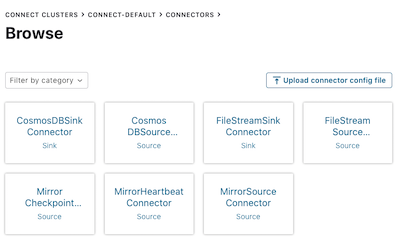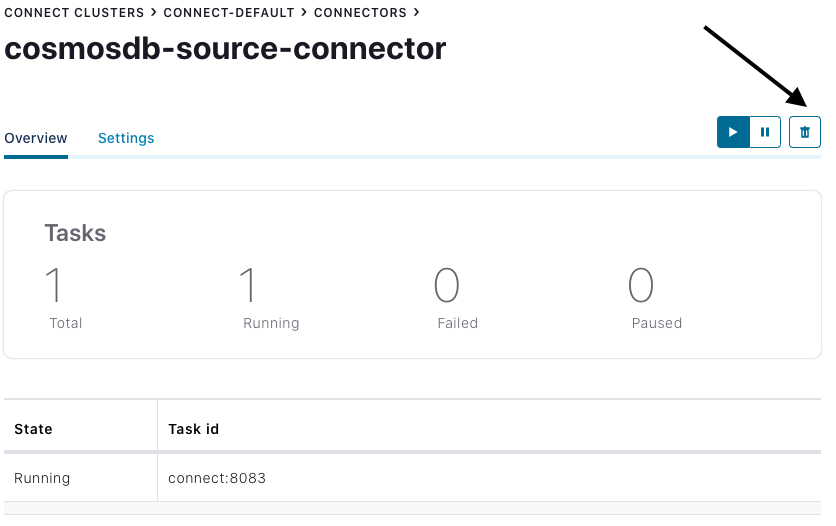kafka-connect-cosmosdb
Kafka Connect Cosmos DB Source Connector
The Azure Cosmos DB Source connector provides the capability to read data from the Cosmos DB Change Feed and publish this data to a Kafka topic.
Topics covered
Quickstart
Prerequisites
- It is recommended to start with the Confluent Platform (recommended to use this setup) as this gives you a complete environment to work with.
- If you do not wish to use Confluent Platform, then you need to install and configure Zookeper, Apache Kafka, Kafka Connect, yourself. You will also need to install and configure the Cosmos DB connectors manually.
- Cosmos DB Instance (setup guide)
- Bash shell (tested on Github Codespaces, Mac, Ubuntu, Windows with WSL2)
- Will not work in Cloud Shell or WSL1
- Java 11+ (download)
- Maven (download)
Install source connector
If you are using the Confluent Platform setup from this repo, the Cosmos DB Source Connector is included in the installation and you can skip this step.
Otherwise, you can use JAR file from latest Release and install the connector manually, refer to these instructions.
You can also package a new JAR file from the source code.
# clone the kafka-connect-cosmosdb repo if you haven't done so already
git clone https://github.com/microsoft/kafka-connect-cosmosdb.git
cd kafka-connect-cosmosdb
# package the source code into a JAR file
mvn clean package
# include the following JAR file in Confluent Platform installation
ls target/*dependencies.jar
Create Kafka topic
Create a Kafka topic using Confluent Control Center. For this quickstart, we will create a Kafka topic named apparels and will write JSON data (non-schema embedded) to the topic.
To create a topic inside Control Center, see here.
Create the source connector
Create the Cosmos DB Source Connector in Kafka Connect
The following JSON body defines the config for the Cosmos DB Source Connector.
Note: You will need to replace placeholder values for below properties which you should have saved from the Cosmos DB setup guide.
connect.cosmos.connection.endpoint
connect.cosmos.master.key
Refer to the source properties section for more information on each of these configuration properties.
{
"name": "cosmosdb-source-connector",
"config": {
"connector.class": "com.azure.cosmos.kafka.connect.source.CosmosDBSourceConnector",
"tasks.max": "1",
"key.converter": "org.apache.kafka.connect.json.JsonConverter",
"value.converter": "org.apache.kafka.connect.json.JsonConverter",
"connect.cosmos.task.poll.interval": "100",
"connect.cosmos.connection.endpoint": "https://<cosmosinstance-name>.documents.azure.com:443/",
"connect.cosmos.master.key": "<cosmosdbprimarykey>",
"connect.cosmos.databasename": "kafkaconnect",
"connect.cosmos.containers.topicmap": "apparels#kafka",
"connect.cosmos.offset.useLatest": false,
"value.converter.schemas.enable": "false",
"key.converter.schemas.enable": "false"
}
}
Once you have all the values filled out, save the JSON file somewhere locally. You can use this file to create the connector using the REST API.
Create connector using Control Center
An easy option to create the connector is by going through the Control Center webpage.
Follow this guide to create a connector from Control Center but instead of using the DatagenConnector option, use the CosmosDBSourceConnector tile instead. When configuring the source connector, fill out the values as you have filled in the JSON file.
Alternatively, in the connectors page, you can upload the JSON file from earlier by using the Upload connector config file option.

Create connector using REST API
Create the source connector using the Connect REST API
# Curl to Kafka connect service
curl -H "Content-Type: application/json" -X POST -d @<path-to-JSON-config-file> http://localhost:8083/connectors
Insert document in to Cosmos DB
Use Cosmos DB setup guide to create and set up Cosmos DB Instance.
- Sign into the Azure portal using the account you activated.
- On the Azure portal menu (left hand side blue lines at the top), select All services.
- Select Databases > Azure Cosmos DB. Then select the DB you just created, click Data Explorer at the top.
- To create a new JSON document, in the SQL API pane, expand
kafka, select Items, then select New Item in the toolbar. -
Now, add a document to the container with the following structure. Paste the following sample JSON block into the Items tab, overwriting the current content:
{ "id": "2", "productId": "33218897", "category": "Women's Outerwear", "manufacturer": "Contoso", "description": "Black wool pea-coat", "price": "49.99", "shipping": { "weight": 2, "dimensions": { "width": 8, "height": 11, "depth": 3 } } } - Select Save.
- Confirm the document has been saved by clicking Items on the left-hand menu.
Confirm data written to Kafka Topic
- Open Kafka Topic UI on http://localhost:9000
- Select the Kafka topic
apparelsyou created - Verify that the document inserted in to Cosmos DB earlier appears in the Kafka topic.
Cleanup
To delete the connector from the Control Center, navigate to the source connector you created and click the Delete icon.

Alternatively, use the Connect REST API.
# Curl to Kafka connect service
curl -X DELETE http://localhost:8083/connectors/cosmosdb-source-connector
To delete the created Azure Cosmos DB service and its resource group using Azure CLI, refer to these steps.
Source configuration properties
The following settings are used to configure the Cosmos DB Kafka Source Connector. These configuration values determine which Cosmos DB container is consumed, which Kafka topics data is written into and formats to serialize the data. For an example configuration file with the default values, refer to this config.
| Name | Type | Description | Required/Optional |
|---|---|---|---|
| connector.class | string | Classname of the Cosmos DB source. Should be set to com.azure.cosmos.kafka.connect.source.CosmosDBSourceConnector |
Required |
| connect.cosmos.databasename | string | name of the database to read from | Required |
| connect.cosmos.master.key | string | the configured master key for Cosmos | Required |
| connect.cosmos.connection.endpoint | uri | the endpoint for the Cosmos Account | Required |
| connect.cosmos.containers.topicmap | string | comma separated topic to container mapping, eg. topic1#coll1,topic2#coll2 | Required |
| connect.cosmos.connection.gateway.enabled | boolean | Flag to indicate whether to use gateway mode. By default it is false. |
Optional |
| connect.cosmos.messagekey.enabled | boolean | set if the Kafka message key should be set. Default is true |
Required |
| connect.cosmos.messagekey.field | string | use the field’s value from the document as the message key. Default is id |
Required |
| connect.cosmos.offset.useLatest | boolean | Set to "true" to use the latest (most recent) source offset, "false" to use the earliest recorded offset. Default is false |
Required |
| connect.cosmos.task.poll.interval | int | interval to poll the changefeedcontainer for changes | Required |
| key.converter | string | Serialization format for the key data written into Kafka topic | Required |
| value.converter | string | Serialization format for the value data written into the Kafka topic | Required |
| key.converter.schemas.enable | string | Set to "true" if the key data has embedded schema |
Optional |
| value.converter.schemas.enable | string | Set to "true" if the key data has embedded schema |
Optional |
| tasks.max | int | Maximum number of connector source tasks. Default is 1. This should be set to equal to or greater than the number of containers specified in the topicmap property. |
Optional |
Supported Data Types
Azure Cosmos DB source connector converts JSON Document to Schema supporting all valid JSON data types.
| JSON Data Type | Schema Type |
|---|---|
| Array | Array |
| Boolean | Boolean |
| Number | Float32 Float64 Int8 Int16 Int32 Int64 |
| Null | String |
| Object (JSON) | Struct |
| String | String |